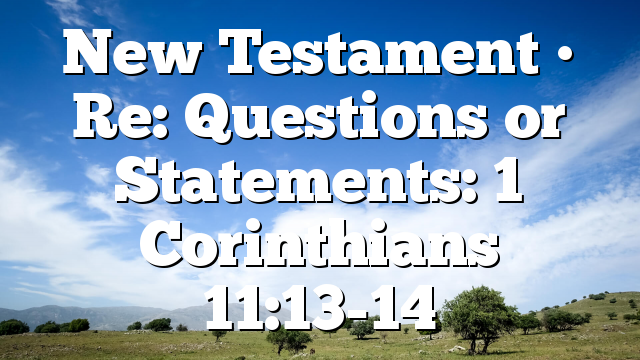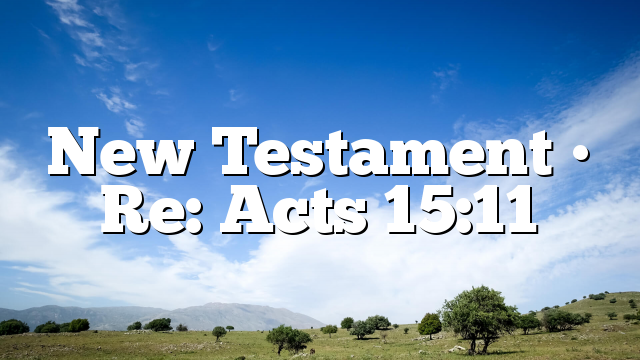Author: ProBible Page 24 / 33
Mark 5:42
Levinsohn is using strengthening as a technical term. It is a fallacy to assume that a technical term means what the non-technical meaning might suggest. One has to study his usage of the term to understand what it means. I haven’t seen any disagreement yet on the actual substance, just unwarranted extrapolations from the particular name he gave to the function. Labels aren’t definitions.
Statistics: Posted by Stephen Carlson — June 26th, 2014, 11:39 am
2 Corinthians 5:20
Lee Moses wrote:Stephen Hughes wrote:It would seem – correct me if I’ve skipped one – that this supplied “you ” of verse 20 is the only exclusive “we” in a chapter of inclusive “we”‘s.If you mean inclusive of the addressees, I do not believe this is correct. Vv. 11-13 make clear that “we” includes Paul, but not the Corinthians:
11 Εἰδότες οὖν τὸν φόβον τοῦ κυρίου ἀνθρώπους πείθομεν, θεῷ δὲ πεφανερώμεθα· ἐλπίζω δὲ καὶ ἐν ταῖς συνειδήσεσιν ὑμῶν πεφανερῶσθαι.
12 οὐ πάλιν ἑαυτοὺς συνιστάνομεν ὑμῖν ἀλλὰ ἀφορμὴν διδόντες ὑμῖν καυχήματος ὑπὲρ ἡμῶν, ἵνα ἔχητε πρὸς τοὺς ἐν προσώπῳ καυχωμένους καὶ μὴ ἐν καρδίᾳ.
13 εἴτε γὰρ ἐξέστημεν, θεῷ· εἴτε σωφρονοῦμεν, ὑμῖν.In this chapter, he is discussing all that he has done and continues to do, as he tells the Corinthians, ὑμῖν.
Yes, you seem to be right about those verses. Thank you for your correction and giving me a chance to look at this question again more closely.
The majority of NTG 1st person plural pronouns are inclusive of somebody at least. [The pronoun can refer on a scale from incuding all of humanity to including just the speaker concerned.] It seems that in this chapter there are 3 plausible inclusivities. There are:
2 Corinthians 5:10 wrote:
Τοὺς γὰρ πάντας ἡμᾶς φανερωθῆναι δεῖ ἔμπροσθεν τοῦ βήματος τοῦ χριστοῦ
“For we must all present ourselves before the judgement of Christ”
This verse seems to be inclusive referring to all peopl e – something for our common humanity.
2 Corinthians 5:5 (RP) wrote:
Ὁ δὲ κατεργασάμενος ἡμᾶς εἰς αὐτὸ τοῦτο θεός, ὁ καὶ δοὺς ἡμῖν τὸν ἀρραβῶνα τοῦ πνεύματος.
This verse seems to refer to all christians.
Εἴτε γὰρ ἐξέστημεν, θεῷ· εἴτε σωφρονοῦμεν, ὑμῖν.
“For if are beside ourselves, it is for you. If we are soberminded- it is for you.”
Here the inclusivity is for Paul and his fellow ministers, who are the “we” and the Corinthians are the “you”.
The vere we are looking at, verse 20, could possibly be any one of those scale of inclusivities. Which one of them is most plausible is ultimately that is a matter of discussion and interpretation.
Statistics: Posted by Stephen Hughes — February 4th, 2014, 6:57 am
2 John 5
RandallButh wrote:
You are on the right track with ‘topicalization’. The WS participial clause has fronting for contextualization, but with καινήν left behind in its default saliency position. Sort of like volunteering in an army joke where everyone steps backward, leaving the volunteer “forward”. (In the language, though, moving foward was a ‘demotion of saliency’/orientation/contextualization/topicatlization, and corresponds to moving backward in the joke.) The ἐντολή object was topicalized and the σοι was dragged along by the verb, as two sub-units within the clause. Maybe even the γράφων σοι can be said to be heightened pragmatically for contextualization in this case by its attraction of σοι.
Thanks for that. I like the idea that the whole part οὐχ ὡς ἐντολὴν γράφων σοι is “topicalized” or “contextualized” and your explanation thereof. I’m not so sure about the reason for the placement of σοι, though, as I don’t see any pragmatical heightening of that element. If I understand Devine and Stephens’ work on the phonetics of the Greek accent correctly, there should be a (pitch) peak at γράφων here — even though it may not be pragmatically prominent.
I’m currently testing a hypothesis that clausal clitics in Koine need to be hosted by the first accentual peak in their intonation unit, so maybe that is why σοι is hosted by this element since the grave accent on ἐντολὴν won’t produce a peak according to D&S. (Of course, if Koine isn’t tonal or if D&S’s work on intonation isn’t applicable to the Koine of 2 John, then this whole line of investigation could be wrong-headed.) There is some flexibility in that οὐχ ὡς ἐντολήν σοι γράφων also fits the hypothesized rule, so this choice would still need to be accounted for, but I think this would have to involve extra heightening on (οὐχ ὡς) ἐντολήν to move σοι from its default / base-generated position, a heightening that does not seem contextually appropriate here.
RandallButh wrote:
I would expect all of this to have been instantly communicated in antiquity through intonation by a good reader or speaker. The frontings would not have had any focal intonation, perhaps generating a kind of residual/latent/secondary focal intonation on the default yet salient καινἠν.
Yeah, that’s the kind of thing I’m exploring and whether there is independent evidence for it in the intonation system as investigated by D&S. In particular, I would be especially interested in instances of fronted lexical graves that are not topics.
Statistics: Posted by Stephen Carlson — January 18th, 2014, 8:22 am
2 Corinthians 3:17
I have decided to lock this thread so that it doesn’t serve as bait.
Specific questions about the use of Greek words and phrases, the wording of Greek manuscripts, and other topics within the purview of B-Greek are welcome in separate threads. These threads should not debate individual groups or translations.
Statistics: Posted by Jonathan Robie — January 7th, 2014, 4:49 pm
Mark 10:32
I also got the black faux leather version. I have to say that it is the nicest looking GNT I’ve seen. Even the black box it comes in is really well done. Two big thumbs up. The page layout is excellent and uncluttered. The paragraph break format…
2 John 11
Stephen Hughes wrote: ↑April 20th, 2017, 1:09 amHow difficult is it to make concordance list this into one with verse-either-side or paragraph contexts? Looking them up one by one and finding the element mentioned is tedious.
Here’s one way you could do that: use a text editor to make lists of verses like this:
CODE:
Luke 19:23; John 17:6; John 17:8Now use a site like Biblegateway that allows you to specify more than one verse at the same time. Here is the format for the URL you need:
CODE:
https://www.biblegateway.com/passage/?search=Luke 19:23; John 17:6; John 17:8&version=SBLGNTOr you can enter the list of verses into their text box and select SBLGNT, if you prefer. Please start a new thread if you want to discuss the results of that, or put it into your moieties thread.
Statistics: Posted by Jonathan Robie — April 20th, 2017, 6:16 am
2 John 1
Stephen, are you familiar with Raymond Brown’s 1978 book, The Community of the Beloved Disciple? It’s speculative, to be sure, but he argues that the Johannine community developed separately from the apostolic church but merged with it toward the end of the first century, at which point the Johannine community suffered a schism in which a “Gnostic-like” majority group walked out “into the world”. Brown’s proposition is that the Johannine epistles are intended to point the right understanding of the Johannine gospel and to warn against the schismatic group, the second and third letters focusing more on those in the schismatic group. That, at least, is my recollection of it, but something like that must be involved in these letters.
Statistics: Posted by cwconrad — January 10th, 2014, 10:47 am
2 John 2
Stephen Carlson wrote:David Lim wrote:Like Carl, I take “δια την αληθειαν” to modify “αγαπω”. If I were to give a reason it would be that it is an adverbial prepositional phrase and must modify a verb form, and the nearest one that fits would be “αγαπω” (not “εγνωκοτες”).Well, there are three possible verbal forms to pick from in order of proximity, ἐγνωκότες, ἀγαπῶ, and the implied γράφει/γράφω. I don’t quite see how it fits better with ἀγαπῶ than with γράφω, however. I can see how giving a reason fits better with writing than with loving, but how would it work with your option: I love you in truth on account of the truth abiding in us? Please explain this further.
I think my explanation wasn’t clear enough. I took “the truth that remains in us” to refer to “the instruction (singular abstract noun) from God that remains in us”, which includes the laws, teachings, revelations, … In the writer’s views, it is natural for anyone, not just him, who loves the laws and teachings of God, to also love “the chosen lady”, and it is not just any type of love (which may be based on many things) but love that is based on truth. What it means for love to be based on truth is explained by the writer later, that it is a very logical thing (now this is going to be slightly interpretive):
[1 John 4:21] and this commandment we have from him: that the [one] who loves God is to love also his brother.
[1 John 5:2] in this we know that we love the children of God: when we love God and keep his commandments.
In the first statement he says that to love his brothers (including the chosen lady) is actually a commandment from God (which is part of “the truth”).
In the second statement he says that by loving God and keeping his commandments we love the children of God, which is a natural consequence of the first statement.
This is the way the love is “because of the truth”.
Stephen Carlson wrote:David Lim wrote:I would take it to be a separate statement, with the focus on the whole “μεθ ημων εις τον αιωνα”. But I’m curious as to the suggested possibility that “εσται” represents the future participle; are there any examples you know that indicate the existence of such a phenomenon of finite verbs that seem to take the place of participles?The statement about “focus” is confusing, because it is a technical term (where only μεθ’ ἡμῶν is in focus, based on fronting: the whole statement is not focus). As for the other issues, there is a certain parallelism between stating that the truth abides within us and then asserting that it will be with us forever. The parallelism of thought, however, is broken by the switch from participle to finite verb form. As you know, participles often do the work of finite verbs.
Indeed participles can easily take the place of finite verbs in various ways, but I understood you (and I think Carl also) to mean that “εσται” functions as a participle, which is the reverse direction. For that I would like to see some examples if you know of any.
Stephen Carlson wrote:David Lim wrote:I understand “εν αληθεια” similarly as “in truth” (“according to what is true”), while “η αληθεια” here refers to “the truth” (“the commandments/teachings/revelations from God”). The former is indefinite, which is why it is the latter that is described as “remaining in us”. Of course, in this context the former implicitly refers to the latter; “it is because of the instruction from God that we keep in our hearts, which is truth, that we love the chosen lady, and not just I but also all the ones who have received this instruction, and this instruction will remain with us for ever.”This explanation is a little confusing if not contradictory, because it is asserted that the former is indefinite but also that it refers to something identifiable. How can it be both? At any rate, I was thinking about the NET Bible’s note on the former:
The prepositional phrase ἐν ἀληθείᾳ (en alhqeia) in 2 John 1 is similar to 3 John 1, although it is not qualified there as it is here (see 3 John 1). This is not merely the equivalent of an adverb (“truly”), but is a theological statement affirming the orthodoxy of Gaius, to whom the letter is addressed. “Truth” is the author’s way of alluding to theological orthodoxy in the face of the challenge by the opponents (see 1 John 3:19).Aside from the confusion over which of the little Johns is addressed to Gaius, they take the phrase ἐν ἀληθείᾳ not be merely adverbial but a reference to orthodoxy. I think you’re doing similar but also trying to have the adverbial usage too?
I do take it as adverbial, but I think it remains an indefinite reference. It is possible for an indefinite reference and a definite reference to refer to essentially the same thing because of the context, though in general it is not the case. For example, we can say “God has power.”, where “power” is indefinite in the sentence itself. At the same time “the power of God” is definite. In the former, we could argue that the indefinite “power” refers to power in general that others may also have, but it is also true that in such contexts we are usually talking about God’s power and not about power in general, so in the end it refers indirectly to the same as the definite reference. In the same way, the indefinite “truth” in “in truth” refers to truth in general, which is why I tried to explain the phrase as “according to what is true” to bring out the indefiniteness. Of course, the context tells us that the writer is not just talking about doing things according to what is true in general, but doing things according to a specific “truth” which appears to refer to “instruction from God”.
Statistics: Posted by David Lim — January 13th, 2014, 10:14 pm
Matthew 12:4
cwconrad wrote:
Just to update my current state of thinking/confusion about this text:πῶς εἰσῆλθεν εἰς τὸν οἶκον τοῦ θεοῦ καὶ τοὺς ἄρτους τῆς προθέσεως ἔφαγον, ὃ οὐκ ἐξὸν ἦν αὐτῷ φαγεῖν οὐδὲ τοῖς μετ᾿ αὐτοῦ εἰ μὴ τοῖς ἱερεῦσιν μόνοις;
Would the construction be better if the φαγεῖν were omitted?
Statistics: Posted by Stephen Carlson — January 8th, 2014, 3:27 pm
Galatians 1:7
To resolve the issue raised in this thread, I googled and hit the following book:
The Greek Article: A functional grammar of o-items in the Greek New Testament by Ronald D Peters et al.
There are some interesting quotes:
p. 3: The article functions as a reduced form of the relative pronoun.
p. 4: Both parts of speech are used by the speaker to indicate that information is
being provided that the recipient is to use FOR THE PURPOSE OF IDENTIFICATION.
.. This stands in contrast to the English definte article and demonstratives, which indicate
that the recipient posseses the information necessary for identification or direct the recipient
to the information respectively.
p. 77: The article functions as a form similar to that of the relative pronoun because it is demonstrable
that the article is used to produce structures that fill the same slot as relative clauses. This represents
a system of choice, whereby a Greek speaker may choose one form or the other. With regard to the production
of text, both structures will the same slot, and thus perform the same function. However, with regard to
the ideational and interpersonal metafunctions, the choice of one structure over the other reflects a difference
in meaning.
——–
Very interesting viewpoint! It seems quite convincing. It answers to my long-held question:
the article + long participial clause looks almost the same as the relative pronoun + finite clause.
The participial clause which can have all compoments of the finite clause, does not seem to so
different from the finite clause structurally speaking.
My question in Gal 1:7 disappears if it is treated as a reduced form of a relative clause,
The same applies to Jude 4.
Moon Jung
Statistics: Posted by moon — June 16th, 2014, 1:07 am
2 John 12
cwconrad wrote:Stephen Carlson wrote:So is it (πολλὰ ἔχων ὑμῖν) (γράφειν οὐκ ἐβουλήθην διὰ χάρτου καὶ μέλανος) or (πολλὰ ἔχων) (ὑμῖν γράφειν οὐκ ἐβουλήθην διὰ χάρτου καὶ μέλανος)?Even if γράφειν is to be understood fundamentally with οὐκ ἐβουλήθην, it would seem that there’s an implicit λέγειν or the equivalent that must be understood with πολλὰ ἔχων ὑμῖν; that is to say, is it conceivable that πολλὰ ἔχων ὑμῖν could stand alone without an implicit infinitive construed with it? I don’t see how the ὑμῖν can construe directly with πολλὰ ἔχων.We have to assume an ellipsis, don’t we?
I similarly read an ellipsis:
“( { πολλὰ } ἔχων ( ὑμῖν ) γράφειν ) { οὐκ ἐβουλήθην [γράφειν] ( διὰ χάρτου καὶ μέλανος ) }”
“having many things to write to you, I did not want to do so through paper and ink”
Statistics: Posted by David Lim — February 9th, 2014, 11:40 am
John 21:7
Χαίρετε, Χριστός Ανέστη.
I thought this is an easy topic for my first post in this forum.
A new greek interpretation of the gospel explains the επενδύτη as a kind of a simple “working garment” (εργατικός σάκκος). Probably a square cloth like apron, still used by fishermen today. So, he just tied hastily the ribbons around his waste. The interpretation explains that he did so in order to go faster to Jesus. Obviously Peter just made some steps into the water but did not swim.
Έρρωσθε.
Statistics: Posted by Georgios — April 20th, 2017, 2:24 pm
John 1:17
Dmitriy Reznik wrote:timothy_p_mcmahon wrote:While hendiadys makes reasonable sense, I’m wondering about the use of the article with both nouns.I found the answer to this in Blass and Debrunner, where there are examples of hendiadys with the article with both nouns:
James 5:10:
τῆς κακοπαθείας καὶ τῆς μακροθυμίας (of perseverance in suffering)Luke 2:47:
ἐπὶ τῇ συνέσει καὶ ταῖς ἀποκρίσεσιν αὐτοῦ (at his intelligent answers)Mk 6:26 = Mt 14:9:
διὰ δὲ τοὺς ὅρκους καὶ τοὺς συνανακειμένους (because of the oath taken before the guests)Also, I found that a famous medieval Jewish commentator Rashi understood חֶסֶד וֶאֱמֶת (lovingkindness and truth) as hendiadys (חסד של אמת, i.e. true lovingkindness)!!
(http://parsha.blogspot.com/2010/12/is-% … iadys.html)Thank you again,
DmitriyP.S. Maybe somebody would like to add something to our discussion?
Thanks.
You must be refrring to Blass, Debrunner here:
§442 (16) The co-ordination of two ideas, one of which is dependent on the other (hendiadys), serves in the NT to avoid a series of dependent genitives
They do suggest translations like “perseverance in suffering” for James 5:10 and “intelligent answers” in Luke 2:47, but I don’t think this is the best or only way of interpreting them.
James 5:10 could as well be understood as the unjust suffering the prophets had to endure and their perseverance in spite of those sufferings. Of course, the two ideas are closely connected and overlapping in time, but is one dependent on the other? I usually think of hendiadys as two nouns where one describes the other and therefore one may be translated by an adjective. There is a tendency to look at the sense of καὶ from an English perspective which sees the two nouns as more distinct than they were intended. Two nouns joined by καὶ are often overlapping in sense, reference or time. It may well be more natural and clear in English to say “patience in the face of suffering” (NIV) than “suffering affliction and of patience” (KJV) or “suffering and patience” (NET).
In Luke 2:47 I am not sure it is accurate to reduce “his understanding and his answers” to “his intelligent answers”, because the previous verse says that Jesus was listening to them and asking questions. I think rather Luke is talking about his insightful questions and his excellent answers to their questions. A Rabbinic dialogue was often in the form of questions and counter-questions in addition to answers.
I have similar hesitation for Mk 6:26. The king could not retract for two reasons: He had made an oath, so he might fear God if he went against it. It would be dangerous. He had made it in public so he would fear the reaction of the guests. It would be shameful.
Nor would I consider it likely that a hendiadys is intended in John 1:17.
ὅτι ὁ νόμος διὰ Μωϋσέως ἐδόθη, ἡ χάρις καὶ ἡ ἀλήθεια διὰ Ἰησοῦ Χριστοῦ ἐγένετο.
There are 3 pairs of lexical contrasts/comparisons:
ὁ νόμος — ἡ χάρις καὶ ἡ ἀλήθεια
διὰ Μωϋσέως — διὰ Ἰησοῦ Χριστοῦ
ἐδόθη — ἐγένετο
The initial ὅτι probably explains the previous χάριν ἀντὶ χάριτος (grace instead of grace). The two words grace and truth also pick up on the same two words in verse 14:
καὶ ἐθεασάμεθα τὴν δόξαν αὐτοῦ, δόξαν ὡς μονογενοῦς παρὰ πατρός, πλήρης χάριτος καὶ ἀληθείας.
It seems to me that John is talking about a new and fuller expression of the grace and truth from God which came with Jesus and goes far beyond what was given through Moses. It does not mean that there was no grace or truth in the Torah, but there is a fuller reality of grace and truth through Jesus. So, I think grace and truth are best kept separate rather than trying to make them graceful truth or truthful grace. If there is a true grace, is there also a false grace?
Statistics: Posted by Iver Larsen — July 2nd, 2014, 3:17 am
James 2:18
RandallButh wrote:
There are also two ways to look at Mt 26.51
ἀφεῖλεν αὐτοῦ τὸ ὠτίον1. One may view αὐτοῦ as attracted to a head phrase for strengthening it, in this case the verb. This is a syntactic device that also fits with what happens with ‘enclitics’.
2. Also, the αὐτοῦ may be fronted within the noun phrase, picking up additional mini-focus.
A live pronunciation would distinguish these two.
In case 1, I would guess that the pronoun may have lost its accent like an enclitic, even though the spelling system retains it. I find myself naturally reading this way when thinking through the clause as in number one, where the pronoun is highly pre-supposed information. Such modern reflexes may indeed reflect antiquity, especially remembering the classic case where Israelis naturally contract “et ha-” -את ה as ta- ת. Even first graders write things like שתיתי תמץ in place of the correct שתיתי את המץ “I drank the juice,” without knowing that BarKochba did the same 1900 years ago מעיד אני תשמים “I call heaven as witness,” and a few other examples. Such writing was not learned in school.
If one reads the written text Mt 26.51 as is, then number 2 is the result. However, the ‘mini-focus’ would probably have had a normal intonation level, not a full focus intonation like in a hypothetical:
αὐτοῦ ἀφεῖλεν τὸ ὠτίον.
This article here http://typo.uni-konstanz.de/ocs-uploads … on-NTG.pdf suggests that a genitive in this position is an external possessor construction.
I still need to evaluate it, but I’m tossing it out there.
Statistics: Posted by Stephen Carlson — May 19th, 2014, 5:37 pm
Romans 3:21
Hi, I found an answer to my question, while scanning the thick grammar book by A. T. Robertson, p. 1184.
Sometimes a word is repeated with DE for special emphasis, as DIKAISUNH in Ro 3:22( cf. 9:30).
9:30:
EQNH TA MH DIWKONTA DIKAIOSUNHN KATELABEN DIKAISUNHN, DIKAISUNHN DE THN EK PISTEWS.
So, if DE can introduce a phrase as Rom 9:30, the answer to my question is obvious.
Moon Jung
Statistics: Posted by moon — June 10th, 2014, 7:52 am
Revelation 14:4
For what it’s worth, I’d certainly agree with Stirling that these datives, given the position in which they appear, ought not to be deemed datives of agent with ἠγοράσθησαν here.
Statistics: Posted by cwconrad — May 19th, 2014, 4:34 pm
Luke 8:20
“`html An Exegetical Study of Luke 8:20: Grammatical Implications of the Singular Passive Verb ἀπηγγέλη and Textual Variants body { font-family: ‘Palatino Linotype’, ‘Book Antiqua’, Palatino, serif; line-height: 1.6; margin: 20px; } h1, h2, h3 { color: #333; } h2 { border-bottom: 1px solid #ccc; padding-bottom: 5px; margin-top: 30px; } h3 { color: #555; margin-top:…
Acts 15:11
Thank you, for answers. I’ve met in christianity teaching: once saved, always saved (in sense: believe in Jesus and you will be saved instantly). I thougt that this text may be bear out so teaching. But the words of Jonathan are important: “It’s not telling us when this salvation occurs, it’s telling us that it can occur by the grace of Jesus Christ, without circumcision, for both Jews and Greeks.”
Thanks
Jarek Romanowski
Statistics: Posted by romanjaro — March 24th, 2017, 2:43 pm
Romans 1:23
ronsnider1 wrote:
My question relates to how one understands and classifies the genitive string in Romans 1:23 that follows the en clause. The entire phrase relates to that which was exchanged for the glory of the incorruptible God, but I am having a little trouble identifying the type of genitives used here.καὶ ἤλλαξαν τὴν δόξαν τοῦ ἀφθάρτου θεοῦ ἐν ὁμοιώματι εἰκόνος φθαρτοῦ ἀνθρώπου καὶ πετεινῶν καὶ τετραπόδων καὶ ἑρπετῶν.
It’s pretty clear, I’d say, that εἰκόνος depends upon ὁμοιώματι and that φθαρτοῦ ἀνθρώπου καὶ πετεινῶν καὶ τετραπόδων καὶ ἑρπετῶν all depend upon εἰκόνος. I would think too that φθαρτοῦ, although linked directly with ἀνθρώπου, is implicitly understood also with the other genitive nouns as well. The four genitive nouns dependent on εἰκόνος all fall under the most basic category of adnominal genitives, whether you call it “possessive” or “genitive of belonging”. Categorizing the adnominal linkage of εικόνος to ὁμοιώματι is perhaps less clearcut (if it really matters — the meaning of the phrase is hardly in doubt!); I think I’d call it an “appositive” or “explanatory” genitive (cf. Smyth, §1322): “a likeness, i.e. an image of … “.
Statistics: Posted by cwconrad — January 30th, 2014, 11:08 am



















